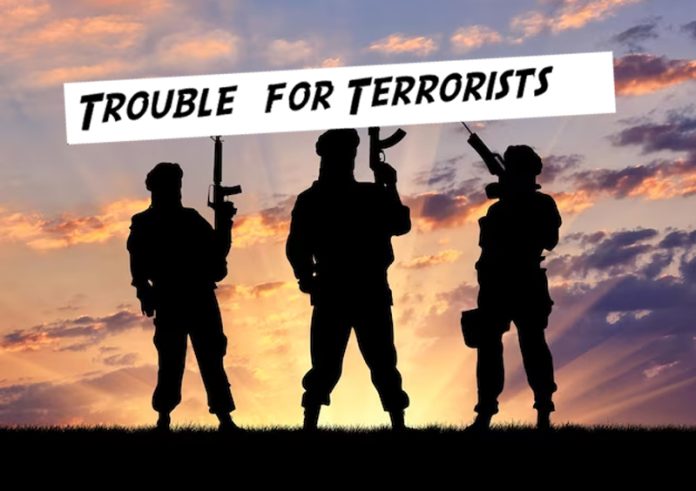A court has unequivocally pronounced 23 terrorists hailing from Kishtwar district, currently orchestrating malevolent activities from Pakistan and Pakistan-occupied Jammu and Kashmir (PoJK), as proclaimed offenders. The legal decree stipulates a 30-day ultimatum for their surrender, failing which the process of attaching their properties will be set in motion. This recent judicial proclamation raises the tally of Kishtwar terrorists, operating nefariously from Pakistan and PoJK and designated as proclaimed offenders, to an alarming 36. Notably, 12 properties among the latest 23 offenders have been identified for potential attachment, with the initiation of the process contingent upon their non-compliance within the specified timeframe. The battle against terrorism unfolds as an unwavering and unyielding campaign, offering no respite or tolerance for those who adhere to an ideology devoid of humanity. It constitutes an unending struggle against the convictions of a select few who dismiss the sanctity of human life. The intricate network of terrorism, deeply entrenched, reveals a disconcerting reality: peeling away one layer merely exposes the vigilant gaze of law enforcement agencies on another.
Over time, the JKP has adeptly honed their tactics to strike at the core of this malevolent force. For some, terrorism has metamorphosed into a way of life-a lifestyle characterised by the brandishing of guns, extortion, and an existence above the confines of the law. Decades passed with terrorists enjoying virtually unhindered reign, but the scenario has undergone a dramatic transformation. The JKP now holds the strategic advantage, establishing dominance over a significant portion of the region. The rule of law has been firmly instituted, prompting individuals to step forward and share vital information-a commendable achievement when contrasted with the horrifying scenes of the early days of terrorism. The Jammu and Kashmir Police, in collaboration with other security agencies, have successfully altered the course of events. The current approach focuses on eradicating even the faintest remnants of terrorism from the landscape. Not only are perpetrators targeted, but their sympathisers also find themselves entangled in the legal repercussions, with their properties rightfully seized. Various separatist organisations, including Jamaat-e-Islami and factions associated with figures like MusratAlam and Syed Ali Shah Geelani’sTehreek-e-Hurriyat, stand banned.
The JKP rightfully garners accolades for its meticulous groundwork. However, this is not the culmination; more such resolute actions will ensue until terrorism is thoroughly obliterated from the annals of Jammu and Kashmir.
The Government has unequivocally declared an all-out war against terrorism, extending its reach wherever the roots of this menace are discernible. The recent court order, demanding surrender within 30 days or facing the confiscation of properties, serves as the latest blow to terrorism. The JKP, in a masterful stroke, sends an unequivocal message to terrorists and their sympathisers: while it may take time, the long arm of the law will inevitably ensnare them. Families have been duly notified, and if these 23 terrorists refuse to surrender, the ramifications will be there. In dealing with separatism and radicalization, there is no room for a kid-glove approach. Meanwhile, in a resolute move, the Union Home Ministry has proclaimed the Tehreek-e-Hurriyat (TeH), a pro-Pakistan separatist group founded by the late hardline separatist Syed Ali Shah Geelani, as a proscribed organization for the next quinquennium. The decisive action, disclosed by the Union Home Minister, is a retaliatory response to the group’s active involvement in fomenting terrorism and disseminating virulent anti-India sentiments within the Union territory of Jammu and Kashmir. With this resolute action, another chapter of separatism is unequivocally sealed. The incontrovertible reality that virtually all perpetrators of violence and terrorism, directly or indirectly involved, have sought refuge in various separatist entities, including TeH, underscores the futility of harbouring an amalgamation of such divisive forces. Maintaining an assembly of separatists, singularly dedicated to an anti-national agenda and perpetually seeking to embarrass the nation through statements or deeds, serves no purpose.
TeH, an outfit that has consistently abstained from participating in any electoral or democratic processes, stands accused of having its members entangled in severe legal cases. Continuing to nourish these elements with a vehemently anti-national disposition is patently irrational. The Government, time and again, has demonstrated unwavering resolve in eradicating such organisations from the regional landscape. Month after month, the noose around these entities has been tightened, aiming to decisively obliterate terrorism and secessionism. The Government, rightly so, is making decisive choices to eliminate the lingering remnants. Former terrorists who metamorphosed into separatists, hawala operators, and sympathisers of terrorism, regardless of their perceived influence, found themselves ensnared by the law and incarcerated.
Trending Now
E-Paper


